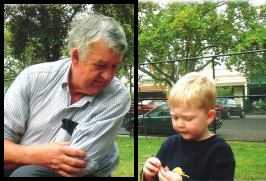
-----
Excessive decarburization due to zinc plating and baking
I am a wholesale distributor of metric fasteners and am having some issues with excessive decarb on some socket head cap screws that have been electro zinc trivalent .0002 min plated and baked. is there a process to reverse this condition
Derek Knottfastener distributor - Blaine, MN, USA
November 25, 2008
November 28, 2008
Hi, Derek. I'm not a metallurgist but it doesn't sound plausible to me. The baking temperature is only 375 - 400 F.
Regards,

Ted Mooney, P.E.
Striving to live Aloha
finishing.com - Pine Beach, New Jersey
Ted is available for instant help
or longer-term assistance.
First of two simultaneous responses --
Ted's quite right, Derek. Decarb can only occur at temperatures over about 750 degrees C (over about 1400 degrees F), and the more common grades of steel will only decarb over about 850 degrees C.
If metallographic examination of sectioned fasteners confirms decarb, it would likely have occurred during the hardening heat treatment cycle after forming and before plating. That is an 850-900 degree C process, and if the oxygen content of the heat treatment furnace atmosphere was not low enough, decarb could occur.
But if you're making your diagnosis of decarb from an observation of soft surfaces on the fasteners rather than from metallographic examination, consider also the possibilities that (a) the fasteners weren't hardened at all after forming, or (b) were correctly hardened but then inadvertently tempered at too high a temperature (above 500 °C instead of around 275 C) thus giving no surface decarb but a through-section softer structure. Either of these conditions could look like surface decarb if you judge by inserting a hex key and seeing deformation of the head when you lean on the key. Metallography will clearly show whether either of these possibilities, or decarb, exists.
But whatever the cause, the condition was there prior to plating. Plating and baking cannot do it.

Bill Reynolds [deceased]
consultant metallurgist - Ballarat, Victoria, Australia
We sadly relate the news that Bill passed away on Jan. 29, 2010.
November 28, 2008
Second of two simultaneous responses --
I also have never heard of such a thing and do not believe that it is possible.
What method of determining your carbon level are you using, both before and after plating?
- Navarre, Florida
November 28, 2008
Q, A, or Comment on THIS thread -or- Start a NEW Thread